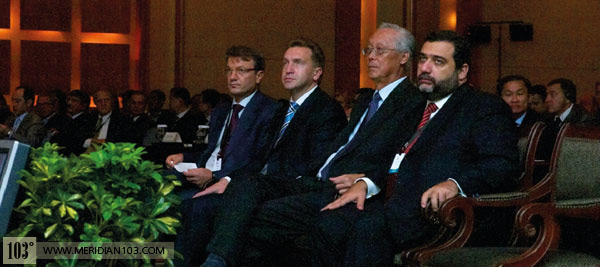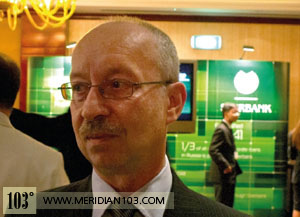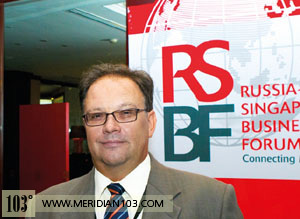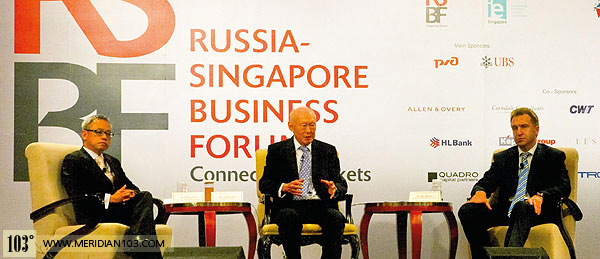THE TALE OF THE BEAR AND THE MERLION GAINS MOMENTUMThe 4th Russia-Singapore Business Forum (RSBF) was held in Singapore in September 2009. The RSBF is an annual international business-to-business platform jointly organized by Troika Dialog, Russia's largest private investment bank, the Singapore Embassy in Russia and IE Singapore, an agency under the Ministry of Trade and Industry which promotes the overseas growth of Singapore-based enterprises and international trade.
Since the inaugural forum in March 2006, the RSBF has grown to become Asia's only business and networking platform for Russian/CIS and Singaporean/Asian business elite and top government officials. As a result of mutual collaboration trade between Russia and Singapore doubled from SGD 1.9 billion in 2007 to SGD 3.8 billion last year. From being ranked as Singapore's 35th largest trading partner in 2007, Russia is now the 28th.
Despite the global economic downturn, this year Forum, themed "Emerging from Turbulence: New Economic Opportunities", drew a record number of more than 600 participants, with about 260 from Russia and CIS, 280 from Singapore and the rest from Asian countries like Japan and Vietnam. The number exceeded the initial target of 350 participants expected by Ambassador Michael Tay, the founder and driving force behind the Forum.
Held from 27 to 29 September, the Russia-Singapore Business Forum (RSBF) attracted political leaders from both Russia and Singapore. Singapore's Senior Minister Goh Chok Tong opened the Forum by identifying several areas for closer cooperation between the two countries. These included innovation, research and development, logistics and services. He also named a few Russian personalities who have already contributed to strengthening bilateral relations. We are proud to count 103rd Meridian East's Editor-in-Chief, Julia Sherstyuk, among them.

Singapore's Minister Mentor Lee Kuan Yew, who had just returned from his fifth visit to Russia in four years, conducted the Forum's closing dialogue. During the talk, he pointed out that he viewed Russia as a promising partner, and was impressed not just by the developments he had seen first hand, but also by the confidence that large MNCs had in the country. MM Lee also emphasised that money should be channelled to the real working economy like infrastructure and education, and not to "superficial activities".
Also participating in presentations and panel discussions were top Russian politicians and captains of industry, including First Deputy Prime Minister of the Russian Federation Igor Shuvalov, former Economic Development and Trade Minister Herman Gref, who is the CEO of Sberbank, as well as Ruben Vardanian, Chairman of the Board of Directors and CEO of the Troika Dialog Group, the foremost private investment bank in Russia.
Singapore's Prime Minister Lee Hsien Loong was among guests at the Forum's closing dinner held at a hotel on Sentosa.
Most of the participating companies were able to achieve tangible results on different levels. Abdul Rohim Bin Sarip (President of the Singapore Malay Chamber of Commerce & Industry) summarised the general sentiments, saying that "the speeches were very frank, very optimistic about Russia-Singapore relations. As a President of MCCI, I hope that my members will be able to participate in some of the events in respective sectors, especially in education. When big companies invest in Russia or have a project there, they require smaller companies to support their contracts. We call it a "mothership" example, and this is how my members would like to participate. And we would like to explore the opportunity to meet with Russian businessmen in Russia, probably by organising a trade mission together with other Chambers of Commerce."
Phelix Gens (Lanit, a leading Russian IT company) attributed the Forum's success to Ambassador Michael Tay: "The world wonders why Russia and Singapore have such great, almost mystical, relations. All this is thanks to Michael Tay and his hard work. It's amazing what he has achieved during his tenure in Russia and what he continues to do."
Mr Michael Tay, who initiated the forum when he was Singapore's ambassador to Russia from 2003 to last year, said he hopes to invite more participants from Asia in future.
'Doing so will add more value for Russia and Singapore,' he said.
103rd Meridian East spoke
to some of the RSBF 2009 participants
 Konstantin Stowolosow, US and Russia (Managing Director, Novell CIS) Konstantin Stowolosow, US and Russia (Managing Director, Novell CIS)
How would you characterise the RSBF 2009?
I think this Forum is the most efficient as compared to all the previous ones. I have already fixed lots of business meetings with people I have met here and found some partners. I came to Singapore with letters from three companies willing to establish a presence here; their people are keen on living and working in Singapore. I personally am very satisfied.
Are you saying that Singapore is an ideal platform for joint projects?
Absolutely! It was clear to me from my very first visit here. And now, I find myself in circumstances where projects I only dreamt of but was not too sure about will most likely materialise.
Will it be difficult for you to integrate into the local cultural context?
No way! I am absolutely comfortable in Singapore. Of course, there are some differences in mentality, but I faced them, too, when I came to Russia from the US where I was raised. One has to familiarise oneself with the surrounding environment and try to fit in. For sure there are some difficulties, but I love a challenge.
Jaisey Yip, Singapore (Centre Director for Moscow, IE Singapore)
How would you explain the obvious success of this year's Forum?
We are involving more international media, pulling in more high-profile people and working with key market players in Russia. If, last year, there was only Troika Dialog, this year we have another joint partner: Sberbank. On the sidelines, we are also working with other banks and institutions, which pull in their clients as well. But the RSBF is not just about numbers; it's about the quality of the people who attend and the business deals that are struck. For instance, Tatarstan signed a MOU with the IDA International agency, which will provide strategic consultancy on e-government for Tatarstan.
 Alexey Dakhnovsky, Russia (Senior Counsellor, Russian Embassy of Singapore) Alexey Dakhnovsky, Russia (Senior Counsellor, Russian Embassy of Singapore)
How is the RSBF 2009 different from the previous three?
In comparison to the first Forum of 2006, when nobody really knew what Russia was, what we are witnessing today is a distinct evolutionary process. Today, issues involved are more diversified: if in 2007 and 2008, discussions revolved mainly around retail or real estate, now there are other spheres, such as education, infrastructure, direct investments and portfolio investments in Russian enterprises subject to privatisation.
What can both parties expect from this Forum?
For Russians, it is a chance to meet with a large number of Singaporeans, who are highly unlikely to come to Moscow: Singapore business missions tend to be narrow in purpose and to comprise no more than 10 to 15 people. In turn, for Singaporeans, it is an opportunity to meet potential Russian partners and, most importantly, to hear with their own ears what is happening and will be happening in Russia.
The relationship between business and state in Singapore is a very close one, of paternalistic type where the government looks after business very well. This is why if state authorities fail to convey the message that Russia is worth its salt, no Singaporean business would come to Russia. But at this Forum, Senior Minister Goh urged Singaporeans to do so, which instilled hope for tangible results in the near future.
Artur Trofimov, Russia (Chairman of the Board of Directors, GEO Capital)
How is the RSBF 2009 different from the previous three?
It is more concentrated, with suggestions being more productive. If Singapore was previously visited mainly for the purpose of tourism, today it has gathered business-oriented people.
How can Russia attract more Singaporeans, many of whom are simply afraid to go there, having a distorted vision of the country?
In the East, there is a strong Confucian tradition prescribing that people tend to look up to their seniors, their leaders. Therefore, if a country's and big companies' leaders are open to dialogue with their foreign counterparts, business will keenly react to this. It is vital that the initial breakthrough happens on the highest level.
Which spheres of business in Russia are most attractive for Singaporean investors?
Logistics. This is because Singapore has vast experience in this area. It is said that Singapore's best asset is its geographical position. Thus, it has great logistic potential, which affects the development of business there. In addition to this, Singapore's knowledge in real estate and starting new technologies from scratch can be applied to Russia's reality. The petrochemical industry would be yet another such sphere.
What could Russia, in turn, share with Singapore?
I guess, Russia is an attractive partner with a large emerging market for Singapore. by Julia Sherstyuk, Natalia Makarova

|
 +65 6696 7068
+65 6696 7068
 info@meridian103.com
info@meridian103.com
 PDA
PDA
 +65 6696 7068
+65 6696 7068
 info@meridian103.com
info@meridian103.com
 PDA
PDA
